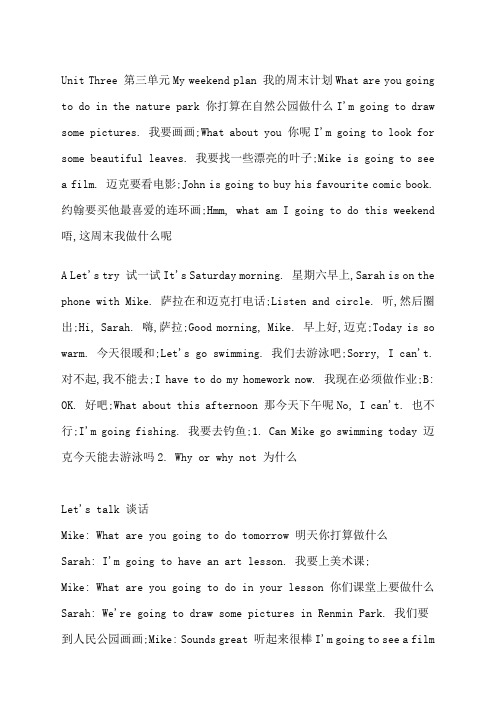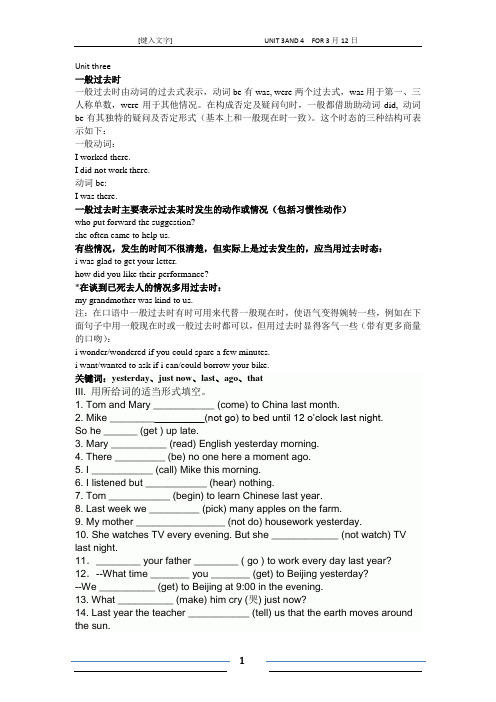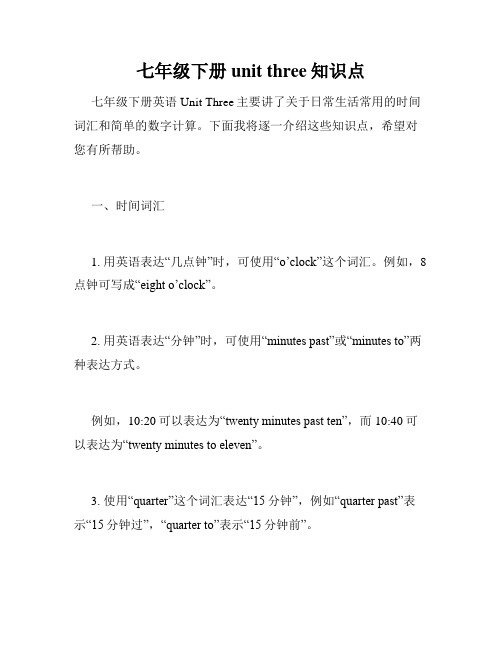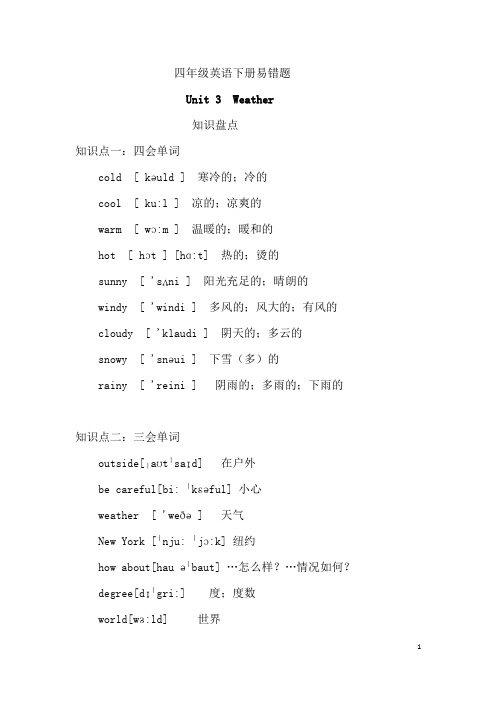unit three
Unit three

BrE First floor footway form good-bye lorry grocer’s shop ground floor guard cannon half a holiday innkeeper
AmE second floor side walk blank good-by truck grocery store first floor conductor gun a half vacation innholder
BrE Post professional purse railway refrigerator roadway shop shop assistant single ticket solicitor spectacles state school
AmE mail career wallet railroad icebox pavement store clerk one-way ticket lawyer glasses public school
AmE airplane air-mail ashcan, garbage can fall bill bath cracker shade dormitory ticket-office shoe recess
13. 14. 15. 16. 17. 18. 19. 20. 21. 22. 23. 24.
1.Be ready for the post: wait for the mail *postbox; postcard; postcode; postmark; postage; postal parcel; registered post; air mail; postal savings deposit 2.flat: apartment; adj. smooth and level 3.when 4.down/on/in/along/by the street 5.bringup
PEP英语六级上册课文Unit新Three

Unit Three 第三单元My weekend plan 我的周末计划What are you going to do in the nature park 你打算在自然公园做什么I'm going to draw some pictures. 我要画画;What about you 你呢I'm going to look for some beautiful leaves. 我要找一些漂亮的叶子;Mike is going to see a film. 迈克要看电影;John is going to buy his favourite comic book.约翰要买他最喜爱的连环画;Hmm, what am I going to do this weekend 唔,这周末我做什么呢A Let's try 试一试It's Saturday morning. 星期六早上,Sarah is on the phone with Mike. 萨拉在和迈克打电话;Listen and circle. 听,然后圈出;Hi, Sarah. 嗨,萨拉;Good morning, Mike. 早上好,迈克;Today is so warm. 今天很暖和;Let's go swimming. 我们去游泳吧;Sorry, I can't. 对不起,我不能去;I have to do my homework now. 我现在必须做作业;B: OK. 好吧;What about this afternoon 那今天下午呢No, I can't. 也不行;I'm going fishing. 我要去钓鱼;1. Can Mike go swimming today 迈克今天能去游泳吗2. Why or why not 为什么Let's talk 谈话Mike: What are you going to do tomorrow 明天你打算做什么Sarah: I'm going to have an art lesson. 我要上美术课;Mike: What are you going to do in your lesson 你们课堂上要做什么Sarah: We're going to draw some pictures in Renmin Park. 我们要tomorrow. 我明天要看电影;Sarah: Have a good time 玩得高兴Mike: You too. 你也是;I have to do my homework now. 我现在必须做作业了;Bye. 再见;Sarah: OK. Bye. 好的;再见;What are Mike and Sarah going to do tomorrow 迈克和萨拉明天要做什么Let's learn 学习Sarah: What are you going to do today 你今天打算做什么Chen Jie: I'm going to see a film. 我要去看电影;visit my grandparents 看望爷爷奶奶see a film 看电影take a trip 旅行go to the supermarket 去超市B Let's try 试一试John is on his way home. 约翰在回家的路上;He sees Amy. 他看到了艾米;Listen and answer. 听,然后回答;Amy, where are you going 艾米,你要去哪儿啊I'm going to buy some fruit. 我要去买一些水果;Nice I'm going to buy some ice cream. 太好了我要去买冰激凌;Do you like ice cream 你爱吃冰激凌吗No, it's for my cousion Jack. 不,是给我表弟杰克的;1. What is Amy going to do 艾米要做什么2. Is the ice cream for John 冰激凌是给约翰的吗Let's talk 谈话My cousin Jack is going to visit me next week.我表弟杰克下周要来看我;That's nice. 太好了;Where are you going 你们要去哪儿We're going to the cinema. 我们要去电影院;We're going to see a film about space travel看一部有关太空旅行的电影;Cool 酷I have lots of comic books about space. 我有许多太空方面的连环画; When are you going 你们什么时候去Next Wednesday. 下周三;Why not go on Tuesday 为什么不周二去呢It's half price then 那时候半价Really Thank you 真的谢谢你Where are John and Jack going next week 约翰和杰克下周要去哪里Let's learn 学习Jack: Where are we going 我们要去哪儿John: To the bookstore. 去书店;I'm going to buy a new comic book. 我要买一本新的连环画; dictionary 字典comic book 连环画word book 单词本postcard 明信片Read and write 读和写Sunday 星期天Dear Diary, 亲爱的日记,Tomorrow is Mid-Autumn Festival. 明天是中秋节;My family are going to get together and have a bigdinner. 我们要全家团聚,吃一顿丰盛的团圆饭;My aunt is going to make mooncakes. 我姑妈要做月饼;My grandma will tell us a story about Chang'e. 我奶奶要给我们讲嫦娥的故事;Robin and I are going to read a poem. 我和罗宾准备朗诵诗歌; This is our poem: 这是我们的诗歌:F is for family. F 代表家庭;We will all be together tonight. 今晚我们团聚一起;A is for autumn. A 代表秋天;It is the autumn season. 现在是秋季;M is for moon. M 代表月亮;We eat mooncakes and tell stories about the moon. 我们吃月饼,讲有关月亮的故事;I is for "I". I 代表我;I am so happy today. 今天我很快乐;L is for love. L 代表爱;We love Mid-Autumn Festival. 我们爱中秋节;Y is for you. Y 代表你;You can be together with your family too 你也可以和家人团聚在一起Tips for pronunciation 发音小提示Listen, clap and repeat. 听,拍手,跟着读;lesson 课程dinner 晚饭;正餐tonight 今晚tomorrow 明天Let's check 检查Listen and tick. 听,然后打勾;1. Hi, John. 嗨,约翰;What are you going to do tomorrow 你明天打算做什么Not much. 没什么;I'm just going to do my home work and buy a postcard tomorrow morning. 我明天上午要写作业,然后买明信片;And you 你呢I'm going to see a film tomorrow afternoon. 我明天下午要去看电影; Great 太棒了Can I go, too 我能一起去吗Question: 问题:What is John going to do tomorrow morning 约翰明天上午要做什么2. Amy, did you see my new comic book 艾米,你看见我的新连环画了吗I'm going to read it this evening. 我今晚要看;Oh, it looks good. 哦,这书看着不错;Can I read it after you 你看完后能给我看吗Yes, I can give it to you tomorrow. 可以,我明天给你吧;OK. Thanks. 好的;谢谢;Question: 问题:What is the boy going to do this evening 男孩今晚要做什么3. I'm going to the bookstore to buy a new dictionary. 我要去书店买一本新字典;Oh, when are you going 哦,你什么时候去This afternoon. 今天下午;The bookstore isn't open this evening. 书店今晚不开;Question: 问题:Where is the boy going 男孩要去哪儿4. I'm going to buy some milk and a newspaper. 我要买牛奶和报纸; Where are you going to buy them 你去哪儿买I'm going to buy them at the small shop near the post office. 我去邮局附近的小商店买;Really 真的I'm going to buy a postcard there. 我要去那儿买明信片;Can I go with you 我能和你一起去吗Sure. 当然可以;Let's go together. 我们走吧;Question: 问题:What is the woman going to buy 女子要买什么Listen again and fill in the blanks. 再听一次,然后填空;1. Hi, John. 嗨,约翰;What are you going to do tomorrow 你明天打算做什么Not much. 没什么;I'm just going to do my home work and buy a postcard tomorrow morning. 我明天上午要写作业,然后买明信片;And you 你呢I'm going to see a film tomorrow afternoon. 我明天下午要去看电影; Great 太棒了Can I go, too 我能一起去吗Question: 问题:What is John going to do tomorrow morning 约翰明天上午要做什么2. Amy, did you see my new comic book 艾米,你看见我的新连环画了吗I'm going to read it this evening. 我今晚要看;Oh, it looks good. 哦,这书看着不错;Can I read it after you 你看完后能给我看吗Yes, I can give it to you tomorrow. 可以,我明天给你吧;OK. Thanks. 好的;谢谢;Question: 问题:What is the boy going to do this evening 男孩今晚要做什么3. I'm going to the bookstore to buy a new dictionary. 我要去书店买一本新字典;Oh, when are you going 哦,你什么时候去This afternoon. 今天下午;The bookstore isn't open this evening. 书店今晚不开;Question: 问题:Where is the boy going 男孩要去哪儿4. I'm going to buy some milk and a newspaper. 我要买牛奶和报纸; Where are you going to buy them 你去哪儿买I'm going to buy them at the small shop near the post office. 我去邮局附近的小商店买;Really 真的I'm going to buy a postcard there. 我要去那儿买明信片;Can I go with you 我能和你一起去吗Sure. 当然可以;Let's go together. 我们走吧;Question: 问题:What is the woman going to buy 女子要买什么C Story time 故事时间What are you going to do tomorrow 你明天打算做什么I'm going to learn how to swim. 我要学游泳;OK. I'll teach you. 好的;我来教你吧;Please don't disturb me. 请别打扰我;I'm learning to swim. 我在学游泳;How can you learn to swim without going to a pool 不去泳池你怎么能学会游泳呢Come on. 快来;Let's go to the swimming pool. 我们去游泳池吧;No I'm afraid of water. 不我怕水;Just jump in 只管跳进去Catch this. 抓着这个;Practise and you will learn. 练习,就能学会; Help Help 救命救命Just try. 试一试吧;This way ... This way ... 这样……这样……OK, now can you do it 好的,现在你会了吗Oh, it's easy. 哦,很容易的;We should always remember: 我们要牢记:"Learn by doing." “实践才能学会;”Songs in each unit 单元歌曲Unit 3 第三单元What are you going to do 你要做什么I'm going to walk on the moon 我要到月亮上行走Hooray Hoorray 万岁万岁I'm going to walk on the moon 我要到月亮上行走Hooray Hoorray 万岁万岁When I grow up, 当我长大了,I'll walk on the moon. 我要到月亮上行走; When I grow up, 当我长大了,I'll walk on the moon. 我要到月亮上行走; What are you going to do 你要做什么I'm going to be a solider 我要当一名士兵Hooray Hooray 万岁万岁I'm going to be a solider 我要当一名士兵Hooray Hooray 万岁万岁When I grow up, 当我长大后,I'll be a solider. 我要当一名士兵;When I grow up, 当我长大后,I'll be a solider. 我要当一名士兵;What are you going to do 你要做什么Now it's your turn. 现在该你唱了;I'm going to walk on the moon 我要到月亮上行走Hooray Hoorray 万岁万岁I'm going to walk on the moon 我要到月亮上行走Hooray Hoorray 万岁万岁When I grow up, 当我长大了,I'll walk on the moon. 我要到月亮上行走;When I grow up, 当我长大了,I'll walk on the moon. 我要到月亮上行走;What are you going to do 你要做什么I'm going to be a solider 我要当一名士兵Hooray Hooray 万岁万岁I'm going to be a solider 我要当一名士兵Hooray Hooray 万岁万岁When I grow up, 当我长大后,I'll be a solider. 我要当一名士兵;When I grow up, 当我长大后,I'll be a solider. 我要当一名士兵;What are you going to do 你要做什么Useful express-ions 常用表达法Unit 3 第三单元What are you going to do tomorrow 你明天打算做什么I'm going to have an art lesson. 我要上美术课;We're going to draw some pictures in Renmin Park. 我们要到人民公园去画画;Where are you going 你们打算去哪儿We're going to the cinema. 我们打算去电影院;When are you going 你们什么时候去Proverbs 谚语Unit 3 第三单元Think today and speak tomorrow. 三思而后行;-------------------Words in each unit 单元词汇表Unit 3 第三单元 visit 拜访film 电影see a film 看电影trip 旅行take a trip 去旅行supermarket 超市evening 晚上;傍晚tonight 在今晚tomorrow 明天next week 下周dictionary 词典comic 滑稽的comic book 儿童的连环画册word 单词word book 单词书postcard 明信片lesson 课space 太空travel 尤指长途旅行half 一半price 价格Mid-Autumn Festival 中秋节together 一起get together 聚会mooncake 月饼poem 诗moon 月亮。
Unit Three 重点短语

Unit Three 重点短语1.by myself 我自己一个2. lead sb to +地点带某人到3. fall asleep 入睡4. start to do=start doing 开始做某事5. wake up 醒来6. with one’s help 在某人的帮助下7. on the floor 在地面上8.next to 在旁边9.arrive at+具体地方/ arrive in+国家、城市=get to 到达10.look around 往….四周看11.you’d better do 你最好做某事12.look after =take care of 照顾13. allow sb to do 允许某人做某事14. apologize to sb 向某人道歉15.on TV 电视播放的16.feel proud of 以…….自豪17.in front of 在…….前面18. between….and……在…….之间19.on the other side of 在…..另一边20.go on a holidy 去度假21. at the bottom of 在…….的底部22.on the morning of the second day 在第二天的早上23.on the radio 电台播放24. go back to 回去25. as soon as 一……就……26.get down蹲下,趴下Unit Three 语法知识1.There is a river next _________my house.A.inB.onC.toD.at2. When we ________the farm, it was already 10:00 o’clock.A. gotB.arrived at B.arrived in D.reached to3. ----What did you do yesterday?----I washed the clothes by ________.A.meB.mineC.myD.myself4.—Look! The boys are playing football over there--- Y es! They are enjoying _________.A.themselvesB.himselfC.herselfD.ourselves5.---Don’t help _________. He can help _________.A.his, himselfB.him, himC.himself , himselfD.him, himself6. When you do something wrong, you should apologize _________othersA.forB.withC.toD.atngLang started __________the piano when he was three years old.A.playedB.playingC.to playingD.play8. My mother is ill today, so I have to _________her at home.A. look aroundB.look afterC.look forD.look at9. She was very tired, she fell _________soon.A.sleepB.sleepingC.sleepyD.asleep10.There is something _________the floor, please pick it up.A.underB.onC. inD. at11.My little brother fell off his bike and hurt (伤害)_________.A.himB.hisC.himselfD.he12.Help __________to some fish, boys and girls.A.yourselfB.yoursC.youD.yourselves13.It’s late now. Y ou’d better _______to bed at once.A.to goB.goingC.goD.goes14.There is a department store _________front of the post office.A.onB.inC.underD.from15. Don’t worry! The waiter will lead us __________our table.A.fromB.toC.onD.with16.My parents don’t allow me _________computer games .A.playB.to playC.playingD.played17. The man ___________the island(岛屿), but he saw nobody.A.looked forB.looked likeC.looked aroundD.looked after18. The boy _________up at seven o’clock yesterday and then he put on his clothes quicklyA.wakeB.wakesC.wakedD.woke19. She appears _________TV every day.A.ofB.withC.onD.in20. Finally, he didn’t find his money __________at home.A.nowhereB.somewhereC.anywhereD. everywhere21.-----Is there anything in your bag?----No, __________.It is emptyA.NobodyB.SomethingC.NothingD.Anything22. There is a big building __________the shop and the hospital.A.betweenB.amongC.overD.on23. I will write to you _________I get to the UAS.A.untilB.as soon asC.as well asD. as possible as24.At last I passed the exam(考试)__________Tom’s help.A.inB.onC.underD.with25.He has two sons, one is a doctor, _________is a teacher.A.anotherB.othersC.the otherD.other26.---Could you give __________a book?----Ok, here you are.A.meB.mineC.myD.myself27.----Who taught you French?----Nobody, I taught _________French.A.meB.mineC.myD.myself28.Betty is old enough to look after ________.A.herB.hersC.herselfD.she29. It’s not easy _________a pet dog at home.A.keepingB.to keepC.keepD.keeps30._______the morning of the first day, we went out for a walk together.A.AtB.InC.OnD.With33.---__________do you like English?----Because it’s very helpful.A.WhatB.WhyC.HowD.When34. It was _________work, we were all __________.A.tiring, tiringB.tired, tiredC.tiring, tiredD.tired, tiring。
Unit Three 短语总结

Unit Three 短语总结1. have longer and curlier hair 有更长更卷的头发2. 唱歌唱得好/更好sing(sang) well / better清楚/更清楚 clearly/more clearly大声/更大声 loudly/more loudly3. run(ran) fast/faster 跑得快/更快4. jump(jumped) high/higher 跳得高/更高5. work hard/harder 工作努力/更努力6. get(got) up early/earlier 起床起得早/更早late/later 起床起得迟/更迟7. Everyone wants to win 每个人都想赢8. The most important thing is to learn something new and have fun.最重要的事情是学到新东西。
9. both …and … …和…两个都…Both Sam and Tom can play the drums, but Sam plays them better than Tom. (山姆和汤姆两个都会打鼓,但是山姆打得比汤姆更好。
10. both of you /us/them… 你的/我的/他们两个都…11. (be) as friendly as …一样的友好serious as … 一样的严肃12. work as hard as … 工作一样的努力…be as hard—working as… 工作一样的努力…13. I study English harder than I did two year ago.我学习英语比两年前更努力了。
14. who is more outgoing your father or your mother?Funnier your father or your mother?谁更外向,你的爸爸还是你的妈妈?谁更有趣,你的爸爸还是你的妈妈?15. who does more housework your mother or your father?sings better your mother or your father?谁做家务做得更多,你妈妈还是你爸爸?谁唱歌唱得更好,你妈妈还是你爸爸?16. Who does homework more carefully, you or your best friend?谁做作业更细心,你还是你最好的朋友?17. Who is more carful, you or your good friend?谁更细心,你还是你的好朋友?18. like to do the same thins as me. 喜欢和我做同样的事情。
Unit three

Unit three一般过去时一般过去时由动词的过去式表示,动词be有was, were两个过去式,was用于第一、三人称单数,were用于其他情况。
在构成否定及疑问句时,一般都借助助动词did, 动词be有其独特的疑问及否定形式(基本上和一般现在时一致)。
这个时态的三种结构可表示如下:一般动词:I worked there.I did not work there.动词be:I was there.一般过去时主要表示过去某时发生的动作或情况(包括习惯性动作)who put forward the suggestion?she often came to help us.有些情况,发生的时间不很清楚,但实际上是过去发生的,应当用过去时态:i was glad to get your letter.how did you like their performance?*在谈到已死去人的情况多用过去时:my grandmother was kind to us.注:在口语中一般过去时有时可用来代替一般现在时,使语气变得婉转一些,例如在下面句子中用一般现在时或一般过去时都可以,但用过去时显得客气一些(带有更多商量的口吻):i wonder/wondered if you could spare a few minutes.i want/wanted to ask if i can/could borrow your bike.关键词:yesterday、just now、last、ago、thatIII. 用所给词的适当形式填空。
1. Tom and Mary ___________ (come) to China last month.2. Mike _________________(not go) to bed until 12 o’clock last night.So he ______ (get ) up late.3. Mary __________ (read) English yesterday morning.4. There _________ (be) no one here a moment ago.5. I ___________ (call) Mike this morning.6. I listened but ___________ (hear) nothing.7. Tom ___________ (begin) to learn Chinese last year.8. Last week we _________ (pick) many apples on the farm.9. My mother ________________ (not do) housework yesterday.10. She watches TV every evening. But she ____________ (not watch) TV last night.11.________ your father ________ ( go ) to work every day last year? 12.--What time _______ you _______ (get) to Beijing yesterday?--We __________ (get) to Beijing at 9:00 in the evening.13. What __________ (make) him cry (哭) just now?14. Last year the teacher ___________ (tell) us that the earth moves around the sun.15. There ____________ a telephone call for you just now. (be)16. There __________ not enough people to pick apples that day. ( be)17. There _____________( be not) any hospitals in my hometown (家乡) in 1940.18. There ____________ enough milk at home last week, wasn’t there?19. Eli ____________ to Japan last week. ( move)20. –When _______ you _________ (come) to china? Last year.1. 分词作状语分词在句子中作状语,可以表示时间、条件、原因、结果(补充说明)、让步、伴随等。
Unit Three 一般现在时

Unit Three 一般现在时一般现在时(1)含义:(2)be动词形式:am, is, areI am a girl. She is a teacher. We are students. (3)实意动词情况We go to school every day. They do homework after school. He does housework every week.(4)三单形式:当一般现在时中是实意动词情况时,主语为第三人称单数时,实意动词要变三单形式。
(和可数名词单数变复数基本一样)a.一般情况加s b.以s,x,ch,sh,结尾的加esc.辅音字母+y,去y变i加es d.do, go加es否定句:助动词帮忙do, does(用语第三人称单数) 助家兄弟一出现,后面动词现原形。
I like apples.—I don’t like apples. He likes apples.—He doesn’t like apples.一般疑问句:do,does提前,后面动词用原形。
I like apples.—Do you like apples?特殊疑问句:特殊疑问句+一般疑问句?He goes to school.—Where does he go? (5)标志词:every day \ every week \ every year.usually \ often \ always \ sometimes课堂练习一、单项选择1. your mother cook every day?A. IsB. AreC. DoD. Does2. Jane go to school by bike? No, she often goes foot.A. Does, byB. Does, onC. Do, byD. Does, go3. In the classroom, our teacher always near the blackboard.A. standsB. standingC. is standingD. stand4. Jenny in an office. Her parents in a hospital.A. work, worksB. works, workC. work, are workingD. is working, work5. He said the sun in the east and in the west.A. rose; setB. rises; setsC. rises, setD. rise; sets6. Ray music and he often to music.A. like; listenB. likes; listensC. like; are listeningD. liking; listen7. Millie English every evening.A. has studyB. studiesC. studyD. studied8. He doesn’t like fruit. He meat.A. likeB. is likingC. likesD. is likes9. Do you like apples? --- ___________A. Yes, I don’t.B. Yes, I am.C. Yes, I do.D. No, I’m not.10. I bananas, but Jerry ______ oranges.A. like, likeB. likes, likesC. likes, likeD. like, likes二、填空题1. Where _____ your sister _____ (learn) English everyday?2. Where _____ you _____ (have) lunch every day?3. The bird often ______ (fly) over the river.4. Jerry ________ (wash) clothes every week.5. He likes milk, but he ___________ (not like) beer.课后练习一、单项选择1. They always ______ to school by bus.A. goB. goingC. goesD. went2. John _______ like his father.A. lookB. lookedC. lookingD. looks3. Does your sister like the red dress? --- ________________.A. Yes, she is.B. Yes, she do.C. Yes, she does.D. No, she does.4. Mike ______ go to school today. He is ill.A. don’tB. isC. doD. doesn’t5. Mike and his friends _______ basketball very much.A. likesB. likingC. likeD. are liking6. He often ______ dinner at home.A. haveB. hasC. hadD. having7. What ______ they often ______ on Saturday?A. does, doesB. do, doC. does, doD. do, does8. The girl us English on Sunday.A. teachB. teachsC. teachesD. teaching9. Leo ______ like PE.A. doesn’tB. isC. don’tD. are10. _______ your father ______ newspapers every morning?A. Do, readB. Does, readsC. Do, readsD. Does, read二、改错1. Mike catch the bus every morning. ____________2. I does homework every Sunday. ____________3. The babies are crying every night. ____________4. The little girl always doing her homework carefully. ____________5. Sometimes I doesn’t like pizza. ____________三、填空1. Where ________ Jerry ________ (spend) his holiday every year?2. Jerry and I __________ (like) ice creams.3. I _________ (want) to go shopping everyday.4. He sometimes ________ (play) basketball with his friends.5. ________ your father _________ (read) newspapers every day?四、句型转换1. Jimmy goes to school on foot every day.改为否定句: _______________________________________.改为一般疑问句: ___________________________________. 肯定回答: _________________________________________. 否定回答: _________________________________________.2. Jerry and Ray go fishing on weekends.改为否定句: _______________________________________. 改为一般疑问句: ___________________________________. 肯定回答: _________________________________________. 否定回答: _________________________________________.。
Unit Three 语法篇

Unit Three 语法篇____________________________________________________________________________________________________________________________________________________________________重点掌握可数名词和不可数名词及there be 句型的用法。
重点语法:可数名词与不可数名词一、可数名词与不可数名词的区别普通名词所表示的人或事物是可以按个数计算的,这类名词叫可数名词。
可数名词分为个体名词(表示某类人或事物中的个体,如worker, farmer, desk, factory等)和集体名词(表示作为一个整体来看的一群人或一些事物,如people, family 等)。
如果普通名词所表示的事物是不能按个数来计算的,这类名词就叫不可数名词。
不可数名词分为物质名词(表示无法分为个体的物质,如meat, rice, water, milk, orange 等)和抽象名词(表示动作、状态、情况、品质等抽象概念,如work, homework, time, health, friendship等)。
二、关于可数名词可数名词有单数和复数两种形式。
指一个人或一件事物时,用单数形式;指两个或多个人或事物时用复数形式。
名词由单数形式变成复数形式的规则如下:1. 一般的名词词尾直接加-s 。
如:book → books room → rooms house → houses day → days2. 以s, ch, sh, x 结尾的名词,在词尾加-es 。
如:bus → buses glass → glasses3. 以"辅音字母+y"结尾的名词,要先将y改为i再加-es。
如:city → cities body → bodies4. 以f 或fe 结尾的名词,要将f或fe改为v再加-es。
UnitThree复习

I want/I’d like/I need/I like__________.
三、尺码(size) 1. What size do you want? 2. = What size would you like?
I want a cheaper one. A: __H_o_w__/_W__h_a_t_a_b_o_u_t_t_h_i_s_o_n_e______?It is only 108 yuan. B: OK. ___I_’l_l_t_a_k_e_i_t ______________. Here is the money. A: ____T_h_a_n_k__y_o_u_____________________.Goodbye, sir.
③I don’t know if itw_i_ll_r_a_i_ntomorrow. If it r_a_i_n_s_tomorrow, I won’t come here. (rain) ④I wonder when it _w_i_ll_b_e_g_i_n_next year. When it _b_e_g_i_n_s_ next year, I will come here. (begin)
Unit Three复习 一、本单元话题
Going shopping
Going shopping
一、售货员招呼顾客: 1. May /Can/Could I help you? 2. What can I do for you?
3.Is there anything I can do for you ? 一般不说:What do you want?
大一英语Unit three

Key words Made Easy
prospect
convey authority
n. 前景 v. 传递;传达 n. 权威
occasionally
adjust
adv. 偶尔
v. 使适应
Key words Made Easy
position
objective inevitable
N: as regards 关于,至于 in/with regard to 关于 in this/that regard在这点上,关于此事 without regard to 不考虑 E.g 我对他过去的事不太了解 We have little information as regards his past. 在这点上他很敏感 He is sensitive in this regard. regarding: (prep) concerning, with reference to regardless: (adv) regardless of 不理会
n. 处境;地位 adj. 客观的 adj. 不可避免的
dismiss
regard
v. 不考虑,自心中摒除
n. 尊重,敬意
Key Words in Part I
1. prospect: (n, v) N: 1) wide view of a landscape, etc 景象景色
e.g 山峰和湖泊的壮丽景色 a magnificent prospect of mountain peaks and lakes
Unit three参考答案

Unit three参考答案Unit Three 参考答案Unit Three是一本教材中的一个单元,主要涉及的内容是某个特定主题的学习。
这个单元的参考答案是为了帮助学生更好地理解和掌握相关知识。
在这篇文章中,我将为大家提供Unit Three的参考答案,并对一些重要的问题进行解答。
首先,我们来看一下Unit Three的主要内容。
该单元主要涉及的是某个特定主题,可能是关于科学、历史、文学或其他领域的知识。
在学习这个单元时,学生需要通过阅读教材、参加课堂讨论和完成作业来掌握相关知识。
对于教材中的问题,学生可以参考以下答案:1. 问题一:什么是科学方法?答案:科学方法是一种通过观察、实验和推理来研究自然现象和解决问题的方法。
它包括观察现象、提出假设、设计实验、收集数据、分析结果和得出结论等步骤。
2. 问题二:为什么科学方法很重要?答案:科学方法的重要性在于它可以帮助我们理解世界和解决问题。
通过科学方法,我们可以进行实验和观察,获取可靠的数据,并通过分析和推理来得出结论。
这样,我们就可以更好地理解自然现象,解决问题,并推动科学的发展。
3. 问题三:科学方法的步骤有哪些?答案:科学方法的步骤包括观察现象、提出假设、设计实验、收集数据、分析结果和得出结论。
观察现象是科学研究的起点,假设是对现象的解释,实验是验证假设的方法,数据是实验结果的记录,分析结果是对数据的整理和解释,结论是对实验结果的总结和归纳。
除了上述问题的答案,还有一些其他重要的问题需要学生注意:1. 如何有效地阅读教材?学生可以采用预习、精读和复习的方法来有效地阅读教材。
预习可以帮助学生了解教材的主要内容和结构,精读可以帮助学生深入理解每个章节的细节,复习可以帮助学生巩固所学知识。
2. 如何参与课堂讨论?学生可以积极参与课堂讨论,提出自己的观点和问题,并与同学和老师进行交流。
这样可以帮助学生更好地理解和掌握教材中的知识,并培养学生的思维能力和表达能力。
七年级下册unit three知识点

七年级下册unit three知识点七年级下册英语Unit Three主要讲了关于日常生活常用的时间词汇和简单的数字计算。
下面我将逐一介绍这些知识点,希望对您有所帮助。
一、时间词汇1. 用英语表达“几点钟”时,可使用“o’clock”这个词汇。
例如,8点钟可写成“eight o’clock”。
2. 用英语表达“分钟”时,可使用“minutes past”或“minutes to”两种表达方式。
例如,10:20可以表达为“twenty minutes past ten”,而10:40可以表达为“twenty minutes to eleven”。
3. 使用“quarter”这个词汇表达“15分钟”,例如“quarter past”表示“15分钟过”,“quarter to”表示“15分钟前”。
例如,3:15可以表达为“quarter past three”,而4:45可以表达为“quarter to five”。
4. 使用“half”这个词汇可表达“30分钟”,例如“half past”表示“30分钟过”。
例如,5:30可以表达为“half past five”。
二、数字计算1. 在英语中,我们使用“+”号表示加法,例如“2+3=5”。
2. 使用“-”号表示减法,例如“5-2=3”。
3. 使用“x”或“*”表示乘法,例如“2x3=6”或“2*3=6”。
4. 使用“÷”或“/”表示除法,例如“6÷2=3”或“6/2=3”。
三、其他除了以上两大类知识点外,本单元还涉及到了一些其他的内容,如询问日期、表示星期几、以及使用英语表达时间的不同方式等。
1. 询问日期,可使用“What’s the date today?”这个问题来询问。
2. 询问星期几,可使用“What day is it today?”这个问题来询问。
3. 表示时间的不同方式包括使用24小时制和12小时制两种方式,具体的表达方式可参考上面所提到的时间知识点。
PEP英语四年级下册unit three知识点总结及讲解

四年级英语下册易错题Unit 3 Weather知识盘点知识点一:四会单词cold [ kəuld ] 寒冷的;冷的cool [ ku:l ] 凉的;凉爽的warm [ wɔ:m ] 温暖的;暖和的hot [ hɔt ] [hɑ:t]热的;烫的sunny [ 'sʌni ] 阳光充足的;晴朗的windy [ 'windi ] 多风的;风大的;有风的cloudy [ 'klaudi ] 阴天的;多云的snowy [ 'snəui ] 下雪(多)的rainy [ 'reini ] 阴雨的;多雨的;下雨的知识点二:三会单词outside[ˌaʊtˈsaɪd] 在户外be careful[bi: ˈkɛəful] 小心weather [ 'weðə ] 天气New York [ˈnju: ˈjɔ:k] 纽约how about[hau əˈbaut] …怎么样?…情况如何?degree[dɪˈgri:] 度;度数world[wɜ:ld] 世界London['lʌndən] ['lʌndən] 伦敦Moscow['mɒskəʊ] 莫斯科Singapore[ˌsɪŋgə'pɔ:] 新加坡城Sydney['sɪdnɪ] ['sɪdnɪ] 悉尼fly[flaɪ] 放(风筝等)love [lʌv](写信结尾的热情问候)爱你的知识点三:常用句型1. What’s the weather like in New York?纽约的天气怎么样?2. What’s the temperature in Beijing?北京的温度是多少?3. How about Beijing?北京呢?4.Is it cold? 天气冷吗?5.It’s 26 degrees.气温是二十六度。
6.Can I go outside now?我现在可以出去吗?7. It’s cold outside. 外面很冷。
大学英语精读第一册 Unit Three

东西方人不同的家庭观念
英语词汇中用“uncle, aunt”来称呼比自己长一辈的人, 不像汉语“叔叔,伯伯,舅舅,姨夫……” 分得那么仔细。 因此可以看出,西方人的家庭规模很小,没必要分得那么 仔细。东方人注重家庭,西方人喜欢独立,子女到了18 岁就要自己独立生活了。如果读书用父母的钱,工作后也 要设法归还。父母年老时也不会与子女住在一起,有能力 是独自生活,年纪大了住政府提供的老人院。西方人“家” 的概念是一对夫妻加一个或几个孩子,还有偶尔来住的父 母与兄弟姐妹。
arrange的用法
arrange: vi. =make preparations, plan作计划, 筹划; 习惯用法:arrange for(安排…,准备…); e.g. I’ve arranged for a boy to help you carry the luggage(行李)。
at other times=on other occasions 在别的时候,平时
e.g. The beautiful lady seldom came downstairs at other times. (这位漂亮的夫人平时很少下楼来。) Collocation: ⑴ at times 有时 ⑵ at all times 在任何时候 ⑶ at a time 每次 ⑷ at one time 曾经 ⑸ at no time 决不
after all = in spite of everything, it must be remembered, nevertheless 毕竟,终究 e.g.
⑴ After all, he’s only 6 yearst be true, after all, that money means everything? (金钱是万能的-到底是不是真的?)
- 1、下载文档前请自行甄别文档内容的完整性,平台不提供额外的编辑、内容补充、找答案等附加服务。
- 2、"仅部分预览"的文档,不可在线预览部分如存在完整性等问题,可反馈申请退款(可完整预览的文档不适用该条件!)。
- 3、如文档侵犯您的权益,请联系客服反馈,我们会尽快为您处理(人工客服工作时间:9:00-18:30)。
Unit 3Reading The many meanings of colour1.personality n.个性;人格eg. Parents’ behaviour will influence the development of a child’s personality She failed in the beauty contest because of lack of personality.Personal a.私人的;个人的;亲自的Eg. Personal affairs; personal problemShe has some personal letters to deal with.The manager paid him a personal call at his flat to discuss the issue with him last night. personally ad.= in person 亲自;就个人而言Personally, I am not in favour of his proposal.The headmaster had each classroom inspected personally.2.fascinating a 迷人的eg. A fascinating smile/ hat/ shop-window / displayfascinate vt.使着迷;是神魂颠倒be fascinated by/ witheg. The little boy was fascinated by/ with different kinds of toys in the toy shop. Fascination n. fascinatingly ad.3.emotional a.感情的;情绪的,易动感情的;感情脆弱的,激起感情的;感人的eg. Emotional problemsan emotional farewell充满感情的送别an emotional person一个情绪化的人emotional music/ language抒情的音乐/语言emotion n. 情感;激动eg. He read the story with emotion.emotionless a. 不露情感的;没有情感的The receptionist answered in an emotionless voice.4.psychologist心理学家psychology n.心理学;心理状态child / educational/ social/ criminal psychologypsychological a. 心理学的;心理的a psychological test/ problem/ warfare/ disorders心理测试/问题/战/ 疾病5.energetic a. 精力充沛的energy n.;energize vt供给。
能量;使。
有活力6.adventurous a. 有冒险精神的;大胆开拓的eg.Space flight is really an adventurous journey.To expand your business , you must be more adventurous.adventure n. C&U冒险的经历;冒险eg. He told his son his adventures in the Antarctic Ocean.A flight in an aircraft is no longer such an adventure as it used to be fond of adventure7.firmness n.坚定;稳固eg. She is a girl with gentle firmness. 它是个柔中待刚的女孩。
a man of firmness of willthe firmness of the materials 材料牢固/ 结实firm n. 公司;商号a.结实的;坚定的;稳固的eg. He has a firm belief in the benefits of hard work.firm musclesas firm as a rock坚如磐石firm friendship牢不可破的友谊a building with a firm foundationtake firm measures采取坚决措施firmly ad.坚定地;稳固地Eg. Many countries firmly oppose human cloning and also object to any experiment in it.8.dislike n.不喜欢;厌恶a dislike of/ for …she has a dislike for/ of noisy music.likes and dislikesvt. dislike doing stheg. He dislikes being played a trick on.9.ambitious a. 雄心勃勃的;充满野心的an ambitious boyan ambitious plan/ attemptambition n. U&Cambition for sth / to do stheg. His ambition to be a lawyer encourages him to work hard.With his firmness of will, he will surely achieve his ambition for a world championship.10.optimistic a. 乐观的be optimistic aboutThe government official is optimistic about the future of the country’s economy situation.optimist n 乐观者optimistically ad. 乐观地;乐天派地11.affect vt.影响;感动;(疾病)使感染/侵袭eg. His health was greatly affected by the cold.The rise in prices will affect people’s lives.When hearing the sad news, he felt too much affected.His left lung was affected by cancer.effect n. have a good/ great/ bad effect on …effective12.decrease v.&n. 减少;降低eg. The number of airline passengers has decreased dramatically since the terrorist attack.The airlines will have to decrease its flights because of the global economic crises.China aims to decrease the inflation rate to 2% by 5%.There was a decrease of 1% in the birth rate last year.(opp.) increase v&n.13.relaxed 轻松的;放松的eg. He needed to be relaxed after the game.relaxing a.eg. the relaxing weather/ exerciserelax vi&vt放松;松懈;eg. Let’s stop working and relax for an hour.His face relaxed in a smile.relax one’s muscles / the disciplinerelaxation n. U&C放松;休息;休闲活动eg. I go hill-walking for relaxation.Fishing is his favourite relaxation.14.familiar a熟悉的(sb)be familiar with sth; (sth) be familiar to sbeg. A good football player must be familiar with the rules of the football games.We are quite familiar with each other as we have been friends childhood.His name is familiar to me , but I just can’t remember who he is.The girl has made herself familiar with the majority of the club member.15.r are a. 罕见的;稀有的The plant is very rare in this country.The necklace is very expensive because it is made of rare metal.It’s rare to see snow in November in Shanghai.rarely ad.不经常;很少eg. He rarely comes to work late.Rarely does he come to work late.16.tense a. 紧绷的/拉紧的;(心理或神经)紧张的eg. tense nervesa tense atmospherea tense gametense musclesIt was a tense meeting, at which the two parties has a heated argument.The players were tense at the start of game.tense n.时态tension n.紧张(状态);不安;拉紧eg. After weeks of tension , the two countries agreed on ceasing the conflicts.The tension in the Middle East is building up again.17. associate vt.&vi将。
